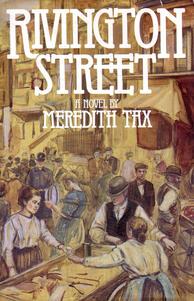Meredith Tax
The 1909-10 shirtwaist strike is a landmark event in American Jewish and feminist history: it unionized the ladies’ garment trade; was one of the first coalitions of feminists and working class women; and most of the people on both sides of the strike were Jews. I encountered the story in the early days of the women’s liberation movement, when I was beginning to research my first book, The Rising of the Women: Feminist Solidarity and Class Conflict, 1880-1917. The story had so many dramatic elements: the Russian Jewish teenage girls who were the spirit of the strike; their union brothers who loved, patronized, and sought to control them; the uptown American feminists of the Women’s Trade Union League; the garment bosses and the gangsters whom they hired to break the strike. The story built naturally from climax to climax: the frail first walkouts; the beatings and arrests of the girls; the intervention of the uptown women, bringing an increase in visibility and resources; the overflow meeting at Cooper Union, where a young striker, Clara Lemlich, took over the stage and electrified the audience by calling for a general strike; the picketing and parades and eventual victory, tragically followed the next year by the hideous Triangle Fire in which 146 workers were killed because the bosses had locked the fire doors.
It was too good a story to leave in a history book. I wanted to bring it to the thousands of women who knew nothing about Jewish history or labor history or class but who would respond to a novel. So I began to write Rivington Street. And, as I did so, a whole family grew in my mind to surround the Clara Lemlich character: a tormented Bundist father, yearning for the revolution he had left behind in Russia; a relentless mother, who enabled the family to survive a pogrom and get to America; a kid sister, whose artistic genius took the form of garment design – all adding up to a family that would be increasingly torn apart by politics as the years went on. I got so engrossed in this family, I wrote another book about them, Union Square, carrying the story through the Jazz Age and Depression and showing how feminism and unions changed with the times.
Meredith Tax was born in Wisconsin and graduated from Brandeis University with a degree in English. While studying in London, she became involved in the anti-war movement and decided she wanted to be an activist. Returning to the U.S. in 1968, she continued her anti-war work and was one of the initiators of Bread and Roses, an early socialist-feminist organization in Boston. Her first important piece of writing, “Women and Her Mind: the Story of Everyday Life” (1970), is considered a founding document of the women’s movement. Her books include The Rising of the Women: Feminist Solidarity and Class Conflict, 1880-1917; Rivington Street, a leftwing feminist family saga of Jewish immigration; its sequel, Union Square; and Families, a children’s book. Tax served as president of Women’s World Organization for Rights, Literature, and Development, or Women’s WORLD which has played an important role in exposing the connections between gender and censorship, and in defending women writers under attack. She died on September 25, 2022.




